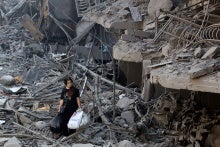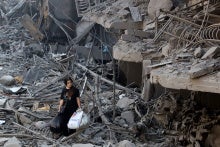“The bombing is very close by, so horror is dominating,” said Zeinab Qabalan Salamieh, a 45-year-old divorced mother of two, living in the Rashidieh Palestine refugee camp on Lebanon’s southern coast.
The Rashidieh camp, which held more than 36,000 people, and other Palestine refugee camps, including Ein al-Hilweh, have come under fire since Israeli forces escalated their attacks on Lebanon in late September. Many have fled to other parts of the country; but Salamieh said she could not afford to leave.
“We are alone here now and can’t relocate because of our financial situation,” she said. “I am unable to buy bread; my children didn’t eat breakfast, and we have no place to go.”
Intensified hostilities began in October 2023 and have escalated since 23 September 2024, disrupting women’s livelihoods in Lebanon and increasing their needs for protection, shelter, food, and health and cash assistance, according to a recent Gender Alert by UN Women.
As of early October, an estimated 520,000 women and girls are displaced and in desperate need of shelter and safety. UN Women estimates that 12,000 displaced families are headed by women.
Journeys of displacement and loss
“I left the camp feeling scared and terrified, crying the whole way because I could hear warplanes and drone sounds,” said Abir Abd Al Karim Houssein, a 46-year-old widow who fled the Rashidieh camp when it came under fire.
“I was overwhelmed with panic and shock,” she said. When she finally made it to Saida, south of Beirut, Houssein said she “saw people sleeping on the streets because they had no shelter, and I felt deep sorrow and sadness. I arrived at a house unfit for living.”
Even in Saida, however, women are not out of danger. Huda Farhat, a 32-year-old who fled from the Rashidieh camp on 29 September, said that Saida was also under fire, thrusting her family back into peril.
“My sister-in-law is in her early stage of pregnancy. She hasn’t been able to do a routine check, and my 2-year-old niece is crying for her father all night,” Farhat said. “My urgent needs now are safety, a safe place for my family, a shelter, health care, and the continuous availability of food—and, of course, for my niece not to grow up without her father.”
There are an estimated 11,600 pregnant women in Lebanon, around 4,000 of whom are expected to deliver in the next three months. They have urgent and unique nutritional and health needs, as well as intensified needs for safety, protection, and psychosocial support.
“My little daughter needs milk and diapers, and I am pregnant,” says Ghadir*, a 23-year-old mother who fled the southern city of Kfar Roummane for Borjein, further north.
“The doctor’s consultation fee and the medications are very expensive,” she said. “It is very difficult and stressful, and I worry a lot about delivering my baby. Will I be able to go to a hospital?”
The crisis has also led to soaring prices, adding a further challenge for displaced women seeking safety.
“We had no choice but to leave with a bag containing only our personal documents,” said 33-year-old Hanan*, who fled the city of Baalbeck, in the Bekaa Valley in eastern Lebanon, after three days of shelling.
“It was one of the most difficult, life-changing decisions I have ever made,” she said, adding, “I live in constant fear that my home will be destroyed, and I worry about my family members who stayed behind.”
But when Hanan and her family arrived in the relative safety of the town of Saadnayel, they were met with skyrocketing rents and prices at local markets.
“Accepting the idea that I am now a displaced person is difficult for me,” she said. “My emotions are a mixture of sadness, anger, and anxiety.”
She added, “I try to be strong in front of my family and siblings, to support them and stand by them, but in the end, I won’t lie to myself — deep inside, I feel suffocated.”
Many women may not have homes to return to, even if the crisis subsides. R.H.*, a 48-year-old mother of four, was forced to flee from her village of Tarayya on 23 September, after airstrikes reduced her family’s home to rubble.
“I don’t know what to do,” she said. “How can I rebuild when everything I had is gone?”
R.H. said that the destruction of her home threw her children’s future into turmoil—but that she could not despair, as she needed to stay strong for her four daughters, who were no longer sleeping or eating well.
“I have to keep going, even if I don’t know what tomorrow will bring,” she said.
UN Women’s response
UN Women is working to provide life-saving assistance and services, aligned with its mandate, to women and girls affected by the conflict. UN Women is working directly with women and girls in need, and is partnering with local women-led and women’s rights organizations to ensure that humanitarian assistance meets the needs and priorities of women, girls, and their families equitably.
This assistance includes emergency cash transfers, gender-based violence protective services, psychosocial and legal support, and assistance that is tailored to the needs of women and girls in marginalized communities, such as women heads of households, widows, migrant domestic workers, and women with disabilities. UN Women’s six-month plan aims to reach more than 200,000 internally displaced women and many women-led organizations.
Throughout the crisis, UN Women will also work to ensure women’s active participation in decision-making processes related to humanitarian response planning, implementation, and monitoring.
*R.H. asked to be identified only by her initials, and Ghadir and Hanan asked that their last names not be identified in this article.

